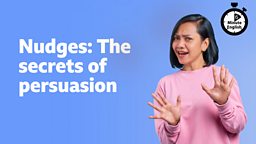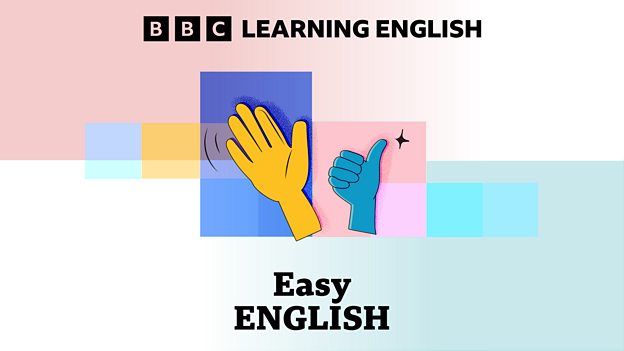6 Minute English
Intermediate level
Making 'mum friends'
Episode 241212 / 12 Dec 2024

_____________________________________________________________________________________________________
Download a free 6 Minute English worksheet!
Download a free transcript!
______________________________________________________________________________________________________
Try more episodes of 6 Minute English:
______________________________________________________________________________________________________
Introduction
Is making new ‘mum friends’ really the positive experience it’s often described as, or an additional stress for already overworked mothers? Beth and Neil discuss this and teach you some new vocabulary.
This week's question
According to the Oxford English Dictionary, where does the term 'play date' come from?
a) Australia?
b) New Zealand? or,
c) the United States of America?
Listen to the programme to hear the answer.
Vocabulary
play date
time that parents arrange for their young children to play together
clique
small group of people who like to spend a lot of time together and may seem unfriendly towards other people
glam
(informal) short for glamorous: visually attractive and exciting
fit into (a group of people)
belong and feel accepted by the other people in a group
down to luck
(informal) depend on chance rather than effort or skill
click with (someone)
quickly feel a friendly connection with someone, especially the first time you meet them
TRANSCRIPT
Note: This is not a word-for-word transcript.
Neil
Hello. This is 6 Minute English from BBC Learning English. I’m Neil.
Beth
And I’m Beth. Do you remember your first day at school, Neil?
Neil
Um, yes I do. I changed schools quite a lot when I was a kid, so I had lots of first days and they were never easy. How about you, Beth?
Beth
Well, my mum always tells this story about how I was crying a lot on my first day. But apparently as soon as she left, I was quite happy. So my mum spent the day being a bit sad and I was completely fine.
Neil
Well, yeah, starting school and making new friends is difficult for many children. But it’s not just the kids who find it challenging. For mums and dads who drop their kids off at the school gates in the morning and pick them up again at the end of the school day, making friends with other mums can be just as hard.
Beth
Here, BBC presenter, Nuala McGovern, discusses this problem using the term, ‘mum friends’.
Nuala McGovern
So if you are a mum dropping off or picking up the kids this week, how do you feel about hanging out with other ‘mum friends’? I find that term kind of interesting as well, mum friends – they’re never called ‘friends’, they’re called ‘mum friends’. Do you struggle to make those relationships, or do you thrive on them, or are you perfectly happy without them?
Neil
‘Mum friends’ are usually the mums of other children in your child’s class at school. They might go for coffee together, help out with babysitting or chat about being a mother. But is making new ‘mum friends’ really the positive experience it’s often described as, or an additional stress for already overworked mothers? That’s what we’ll be discussing in this programme, along with some useful new vocabulary.
Beth
And if the idea of ‘mum friends’ is new to you, why not take a minute to read through the list of vocabulary before you listen? It’s easy to find on our website, bbclearningenglish.com.
Neil
Now I have a question for you, Beth. Another term often associated with ‘mum friends’ is play date – a time that parents arrange for their children to play together. But according to the Oxford English Dictionary, where does the term come from? Is the origin in:
a) Australia?
b) New Zealand? or,
c) the United States of America?
Beth
Um, I'm gonna guess the USA, C.
Neil
OK. Feeling confident?
Beth
Yes!
Neil
Well, we'll see at the end of the programme. For some mums, dropping their kids off at school reminds them of when they themselves were little and under pressure to make friends. Listen as mum, Jayne Cherrington-Cook, describes these feelings to BBC Radio 4 programme, Woman’s Hour:
Jayne Cherrington-Cook
The school gates take you back to being back at school. It's like you said, a high school clique. You’ve got the sporty mums over there, you’ve got the glam mums over there, you've got, you know… And if you don't fit into one of those it's really, really difficult to navigate, and yet you're all there just because your children were born in the same year. It's a really weird thing!
Beth
Jayne says that mums often form cliques, small groups of people who like spending time together and seem unfriendly towards others. For example, at Jayne’s daughter’s school there’s a clique of sporty mums, and a clique of glam mums who put on make-up and dress up. Jayne uses the adjective glam as a shortened form of the word, glamour, meaning attractive and exciting.
Neil
Problems start when someone doesn’t fit into one of the cliques. If you fit into a group of people, you feel you belong and are accepted, probably because you are similar to them.
Beth
So some mums feel rejected from cliques and worry about their children being left out of play dates. But other mums don’t mind – if people want to be friends that’s fine, and if they don’t, that’s fine too! Being a mum is hard enough without adding more stress. Jayne definitely belongs to this group, as she explains to BBC Radio 4’s, Woman’s Hour:
Jayne Cherrington-Cook
I think I'd had some really bad experiences at baby groups where you're trying to make your child do yoga or paint when they're four months old, and trying to bond with these other women and I just thought, ‘This is ridiculous!’ And I pretty much straight away realised it was gonna be just down to luck if I met somebody that I clicked with.
Neil
Jayne says it’s down to luck if she makes mum friends. If you say something is down to luck, you mean it depends on chance rather than any skill or effort you make. But there’s always the possibility you’ll meet someone and click with them, become friends as soon as you start talking.
Beth
Well, I know something that isn’t down to luck, Neil – the answer to your question.
Neil
Ah yes. I asked you about the origin of the term play date. Which country does it come from?
Beth
I think it's the USA.
Neil
Well Beth, you are right. [Yay!] So well done. According to the Oxford English Dictionary, ‘play date’ was first used in the Lincoln Daily Star newspaper in Nebraska, USA in 1915.
Beth
OK, let’s recap the vocabulary we’ve learned, starting with play date – an arrangement that parents make for their young children to play together.
Neil
A clique is a small group of people who spend a lot of time together and may seem unfriendly towards other people.
Beth
Glam is short for glamorous, meaning visually attractive and exciting.
Neil
If you fit into a group of people, you belong and feel accepted by them because you’re similar to them.
Beth
If you say something is down to luck, you mean that it depends on chance or luck, rather than any skill or effort you make.
Neil
And finally, if you click with someone, you feel a friendly and positive connection when you meet them for the first time. Once again our time is up. Why not head over to the 6 Minute English website to find a quiz and worksheet for this programme while it’s still fresh in your mind. See you again soon, goodbye for now!
Beth
Bye!
Latest 6 Minute English

Embarrassed to go to the doctor?
Episode 241226 / 26 Dec 2024
Have you ever been embarrassed to go to the doctor?

Call centres: Are you talking to AI?
Episode 241219 / 19 Dec 2024
Have you ever phoned up a company and had your call held in a queue? Could AI make this less painful?

Making 'mum friends'
Episode 241212 / 12 Dec 2024
Is making new ‘mum friends’ the positive experience it’s often described as?

Can you trust ancestry DNA kits?
Episode 241205 / 05 Dec 2024
Are DNA ancestry tests a reliable way to trace your ancestry?

How babies learn to talk
Episode 241128 / 28 Nov 2024
What do babies need to learn to do to be able to talk?


The bond between sisters
Episode 241114 / 14 Nov 2024
Are the stereotypes about older and younger sisters true?


Why you need a good night's sleep
Episode 241031 / 31 Oct 2024
Why is it so important to get a good night's sleep?

Divorce: Why does it happen?
Episode 241024 / 24 Oct 2024
How is divorce talked about in different countries?


Did Taylor Swift fans cause an earthquake?
Episode 241010 / 10 Oct 2024
Did Taylor Swift move the Earth?


Learning a new food culture
Episode 240926 / 26 Sep 2024
Would you find it different to adapt to a new food culture?

Saving water in the driest place on Earth
Episode 240919 / 19 Sep 2024
How do farmers in the driest place on Earth manage to grow crops? With this solution!



Chocolate: Meet a real Willy Wonka
Episode 240829 / 29 Aug 2024
Would you like to be a chocolate maker, like Roald Dahl's Willy Wonka?

Why we love dumplings
Episode 240822 / 22 Aug 2024
Warning! This episode might make you very hungry...

Kids and climate change
Episode 240815 / 15 Aug 2024
What are young people's thoughts on climate change?


The science of falling in love
Episode 240801 / 01 Aug 2024
What's really happening in our brain when we fall in love?

AI to reduce animal testing
Episode 240718 / 18 Jul 2024
Could AI reduce the need for animal testing?

Why read books, not screens?
Episode 240718 / 25 Jul 2024
Why is it better to read from a book than a screen?

The school that puts the kids in charge
Episode 240711 / 11 Jul 2024
What happens when you put the kids in charge of the school?

What can we learn from toddlers?
Episode 240704 / 04 Jul 2024
Learn to speak to yourself in the way that toddlers do!

How learning to read changes lives
Episode 240627 / 27 Jun 2024
How can literacy change people's lives?

Building a better world with wood?
Episode 240620 / 20 Jun 2024
How can buildings made from wood help our mental health?

How names can tell painful stories
Episode 240613 / 13 Jun 2024
Could our name have painful baggage?

E-rickshaws driving away pollution
Episode 240606 / 06 Jun 2024
Could E-rickshaws give us cleaner air?




Bitter food, better health?
Episode 240509 / 09 May 2024
Could bitter foods be better for your health?







Disability in music and theatre
Episode 240321 / 21 Mar 2024
Learn about the people who are making it easier for disabled musicians and music fans to perform and see live music


Sewing to fight period poverty
Episode 240307 / 07 Mar 2024
Period poverty affects over 500 million people worldwide. How can a volunteer project help?

Plastic waste eaten by enzymes
Episode 240229 / 29 Feb 2024
Plastics can be difficult to recycle. Could a recently discovered enzyme help?

Feed your brain
Episode 240222 / 22 Feb 2024
Food is fuel for our brains. So, what should we be eating?

Food for new mums
Episode 240215 / 15 Feb 2024
Having a baby is exhausting! What do mothers need to eat after giving birth?

Fighting loneliness with soup
Episode 240208 / 08 Feb 2024
Hear how a project in the Netherlands is helping in the fight against loneliness


How the language of menus matters
Episode 240125 / 25 Jan 2024
Why is the language used on menus important?










